
<Back to contents> <Next chapter>
7 - Earning a crust

After buying the land and building the A frame, I had pretty much worked my
way through the money I had inherited from my great aunt, and it was time to
think about earning some more, so that we could continue our life in Skiathos.
In theory, we were tourists in Greece. We were not allowed to work, and we had
to renew our Tourist Visa every 3 months. Although we could get the odd (black)
job here and there, we knew it would be barely enough to live on, and we knew
that we could get much better paying jobs in Holland. We drove back in the autumn
of ’74, in the Land Rover, with our friend, Angie. She and her boyfriend
had returned from India and stayed with us to help build the house, but her
boyfriend had subsequently left. It took us 5 days and nights, and we slept
in the back of the vehicle each night (with Angie on the seats in the front),
as we could not afford hotels. Bread and cheese, and the occasional hot meal
cooked on camping gas, sustained us throughout the journey. The Land Rover had
no power steering, and Lida would reluctantly only do a bit of the driving,
so by the time we arrived, my shoulders were aching badly.
When they had still been together, Lida and Adri had bought a house in Zaandam,
just outside Amsterdam. It was mostly a wooden “dike house”, up
on the road, above the lower land below. (If you want to know how the Dutch
reclaimed land using “dikes and polders”, I recommend looking it
up on Wikipedia. Fascinating!) Lida still owned half the house and we went there
to stay. We found work even though all our friends said that there was almost
no work in Holland, at the time. The fact is, that if you want to work (and
knew that it was only for a few months), you could always find something. Lida
worked as a medical secretary again, and I found work loading and unloading
lorries. I didn’t mind what work I found, as long as it was mostly outside
in the fresh air, even though it was winter time. We could live off the money
I made and stash Lida’s income (which was considerably better than mine)
to bring back to Greece. We worked for three and a half months, and managed
to save quite a bit. Adri had a Danish girlfriend, Susanne (“Suzy”),
and we slept in 2 bedrooms in the attic of the house. Angie slept in the cellar.
The attic roof had no insulation, and snow was sometimes blown through the gaps
in the roof tiles, so you can imagine how cold it got. Definitely a sex killer!
The main room had a gas heater, which was very efficient, but the heat didn’t
get up to the attic. We also helped Adri and Suzy redecorate the house. They
had only recently moved in and there was lots of old, dingy wallpaper everywhere.
Under the wallpaper were good tongue and groove planks which we exposed, then
sanded down, and finally painted. A much nicer result.
Soon it was time to think about getting back to Skiathos as spring was on its
way. Angie decided to stay on in Zaandam, as she didn’t fancy returning
to the UK. We did this every winter for the next 3 years, and finally one last
time in the summer of ’78. That was a mistake as it rained almost nonstop
for the first 22 days that we were there! I didn’t feel like I had had
a summer at all. Lida always managed to get a well-paid job, and as always,
I did whatever was necessary to put food on the table. My criterion was always
fresh air! For the rest, I didn’t mind what I did. Keith ended up staying
in Zaandam after he got out of Greek jail so for a couple of winters we spent
a lot of time together. He eventually moved out (as did Angie) and bought a
house boat in Amsterdam on the Amstel River. The last time we were there, in
the summer of ‘78, Adri and Suzy had gone to the south of France, to visit
old friends there, Hans (Dutch) and Linda (English) and their daughter Sammy.
We are not sure what happened but Adri returned with Linda and Sammy, and Suzy
remained with Hans. It was the end of the “Zaandam phase” of our
lives as Adri wanted to sell the house and move to France with Linda and Sammy.
It had never felt like Lida’s house to us, and we had our own house in
Zorbathes, so Lida sad that when they finally got divorced, she would not make
any claim on their joint property. They had discussed divorce and started the
paperwork, and the decree nisi came through after we returned to Greece. The
lawyer wrote to Lida saying that this was the most amicable divorce he had ever
been involved with. We still have contact with Adri – he is on his third
wife now.
Back in Skiathos, we worked on our land, which still needed a lot of clearing,
built the barn, and added to the house. We worked for the wealthy villa owners,
me laboring and Lida cleaning, and again, with this income we could live. We
used the money saved in Holland for building and general investment in improving
our life style. We never borrowed money, if we didn’t have any, we didn’t
do anything. When we had, we used it for further building. See the chapter entitled
“Shelter from the storm” to read about our building exploits.
In 1980, Greece joined the (then) Common Market (now the EU), and I thought
it was time to try to become registered as a farmer. We had around 100 olive
trees, 15,000 m2 of land, were growing most of our own vegetables, kept chickens,
etc. and I was fed up with still being registered as a “tourist”.
I went with my Greek friend from Volos, Dimitris, to the Town Council, and after
some enquiries met the lady who was in charge of the “Agrotis” (Farmer
or Peasant) Department. Dimitri explained that I wanted to be registered as
a farmer and living here full time. “Ah” she said, “You want
the farmer’s free medical insurance and pension, eh?” “No”,
I said, “I just want to be a farmer and be allowed to live here full time,
as is my right as coming from a member country of the Common Market.”
“Yes, yes”, she said, giving me a knowing look, “Of course,
of course. But what you really want is the farmer’s free medical insurance
and pension, eh?” “Look”, said I, “If I really have
to accept those terms, I’ll go for it.” “Alright then”,
she said, and registered me! This started to make our life a bit simpler, and
instead of going every 3 months to the Police to renew our “tourist”
status, we only had to go every 5 years to renew our resident’s status.
We had by this time acquired some goats (see “Animals”) and I was
now free to sell the milk, cheese, and yoghurt we made, and also sell the baby
goats in the springtime. A little bit more income. I still wasn’t registered
at the Greek tax office, and that caused some minor problems. After a few years,
they called me in and told me that I should have been paying tax on any income
I had made. I gave them the old “Greek shrug” and told them that
no one had informed me, but what do I owe you? After some hours of questions,
they said that I should pay a paltry sum and then make a tax return every year.
I paid the money and went to consult an accountant. He told me that my status
as an “Agrotis”, was worth gold and never to change it. Apparently,
farmers and peasants in Greece get quite a few good deals (like the free medical
insurance), but a lousy pension. Still, seeing as, at that point, I wasn’t
paying for a pension (and being a pensioner seemed so far away), this didn’t
bother me. His advice was, indeed, very good, and I am still a (now retired)
peasant to this day. Some years later, farmers had to start paying for their
pension, and I did so willingly. I am now receiving the pension. It is, indeed,
quite small, but it helps getting food on the table and, at a (severe) pinch,
we could probably live off it.
I discovered in Greece’s hot climate that land without water was of very
little use. We tried to grow a few vegetables and planted some flowers outside
the “A” frame, but it was a struggle without much result. After
we had developed water (see the chapter “Water”) things changed
dramatically and we started to make a larger vegetable garden. We initially
sold any spare produce to villa owners and friends but then decided to try to
do it commercially. Once I had become registered as a farmer, rather than a
“tourist”, we could sell our vegetables, etc. I also needed a paper
from the Mayor stating that I could sell my produce on the streets of Skiathos,
but that proved relatively simple to get, as I was now a registered “peasant”
farmer. We needed a steady income and the goats just didn’t provide enough,
so I thought about starting a market garden. I had the land, the water and the
tractor and had acquired some knowledge of growing things over the years of
trying to be self-sufficient. However, I could foresee that it would be a lot
of work for one person so I approached Reese and asked him if he would be interested
in a partnership. He and Patti had gone their separate ways some time before
and he had had a series of lady friends since. He was also in need of some income
so we agreed to try it and see what happened. (“See what happens”
has more or less been my motto for life. I am always trying new things –
it’s the Aries in me - and I then go with what works. Luckily, most of
the ventures I have been involved in have turned out fine and I think that the
spirit of Skiathos has somehow helped me with them, although there is no way
to define that. Lida cocks an eyebrow whenever I moot some new – seemingly
crazy – scheme, but always gives her support and comes along behind me,
mopping up the messes while making sure that I don’t go totally “over
the top”.)
Reese and I started planting around 2,000 m2 of my land in the spring of 1981
and we soon discovered what a lot of work was involved. It was not necessarily
so physically hard but we had to be in there every day making sure the weeds
didn’t get a hold, staking and tying up tomato plants and a hundred other
small jobs that consumed many hours. The biggest job was watering the garden
and a section had to be done every evening. The traditional Greek way to do
this was to have trenches along the rows of plants with one main trench coming
down the rows. Opening and closing small earth dams directed water into the
rows, one after the other. This consumed a lot of time and my mind sought ways
to get around this. Eventually I developed a system using a pipe with holes
at every row trench that filled the rows slowly at the same time. This was a
precursor to the drip system we eventually used a year or two later and meant
that we didn’t have to be there in person to direct the water, but could
spend the time doing other work instead. We were the first to use drips on the
island and later, the first to use (reusable) black plastic mulch.
We planted everything that grows well in this climate; beans, tomatoes, courgettes,
peppers, aubergines, etc. Once we started to harvest the vegetables, we thought
it would be a good idea to try to sell them at the corner of the road that led
to where most of the rich villa owners lived. This didn’t work very well
(and also upset the owner of a small supermarket in the area) and we brought
much of our vegetables back home. At this point, Lida and Zoi (our first daughter)
and I left for the UK in our quest to get married. Reese decided he would try
selling in Skiathos Town and drove the tractor and trailer to near the Health
Centre at the top of town and started shouting our wares. This proved more successful
and the local women took nearly everything. From that point on, this area (know
as Aghias Triada) became our starting point for all sales. Occasionally, there
would be one or more of the local “Agrotees” already there with
panniers on a couple of mules and they would treat our arrival with surly looks.
We always immediately moved on as we didn’t want to upset them and we
respected the fact that they had been doing this all their lives whilst we were
just “hippie newcomers”. After a while, when they realised that
there was enough business for all of us and that we were not trying to do them
out of a living, they would ask us to stay. We then got along famously and they
taught us quite a lot about raising vegetables commercially here, as they had
a wealth of experience. Over the years, they stopped as old age caught up on
them and we eventually became the main supplier of vegetables to that top area
of town. We always grew our vegetables organically using natural sources of
fertilizer: compost, manure and cotton seed waste. We never sprayed or used
artificial fertilizers. I am not sure that the local women really believed that
everything was organic but they did know that the vegetables tasted better and
lasted longer than what was offered in the shops, so it was not often that I
brought much back from market.
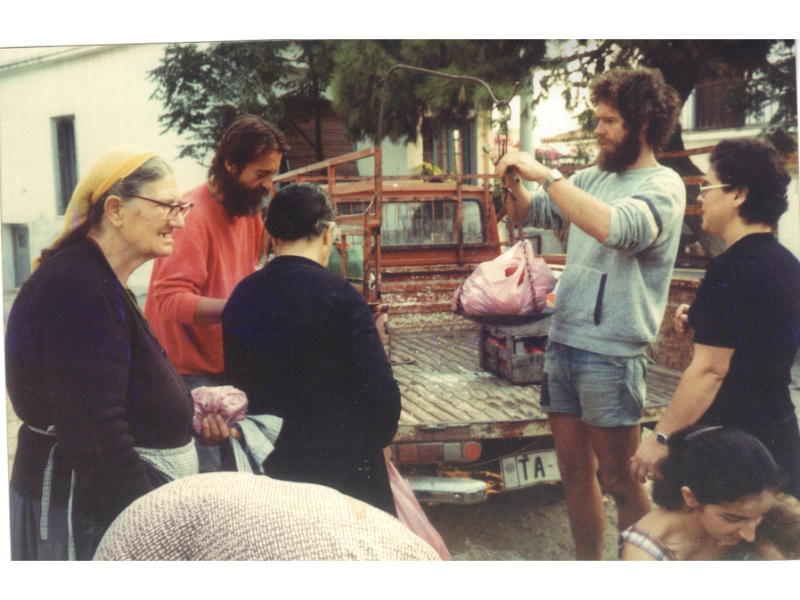
Geof weighing the veg with Reese assisting
Our vegetables became famous on the island. The women would
sometimes fight for the fresh green beans, and the men loved our cucumbers.
We pioneered small cucumbers and sold them by the kilo rather than by piece.
Changes like this were always greeted by lots of criticism from the locals,
who like all small communities, liked to have things done the way they were
always done. However, as the vegetables were so good (and we were foreigners,
who really didn’t know any better), they accepted the changes, and after
a while, were proud to be part of them. When we weighed the vegetables we always
threw in an extra tomato or handful of beans and this kept the local ladies
coming back. An older gardener, who used to weigh his vegetables and charge
for every gram, was known as “Pharmakis”, because he weighed like
a pharmacist. It wasn’t an affectionate nickname! 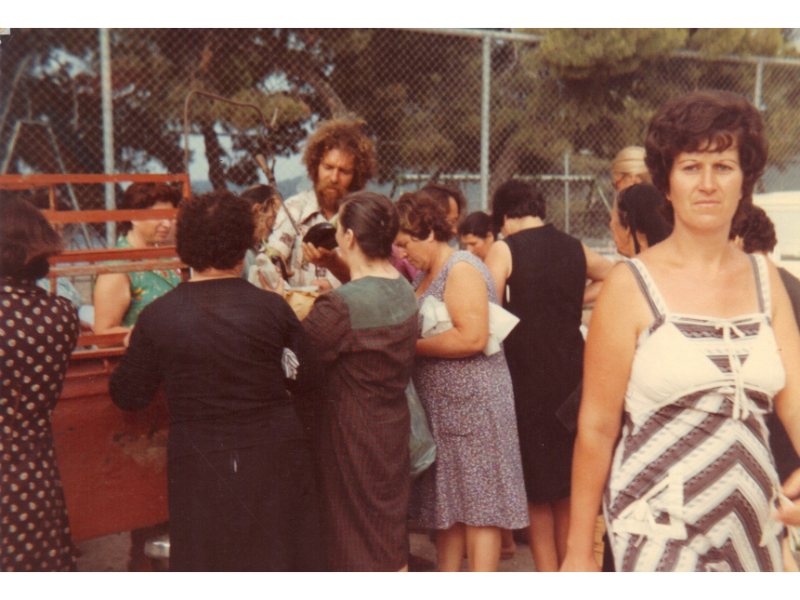
The local women crowding around for our famous green beans
Reese was then living with a lovely Australian lady called Gillie and their intention was to move to Australia. He had sold his land to an unscrupulous Greek but never received the full amount of payment for it. He had met a Scotsman called John in London the winter before, and he turned up one day to see what this island was that Reese had been raving about. John was introduced to me by Reese and, after getting to know him a bit better and liking him immensely, I suggested that he might be interested in doing the garden with me the following summer as Reese and Gillie were definitely leaving in the autumn. He said “Why not?” and a relationship was started that continues to this day.
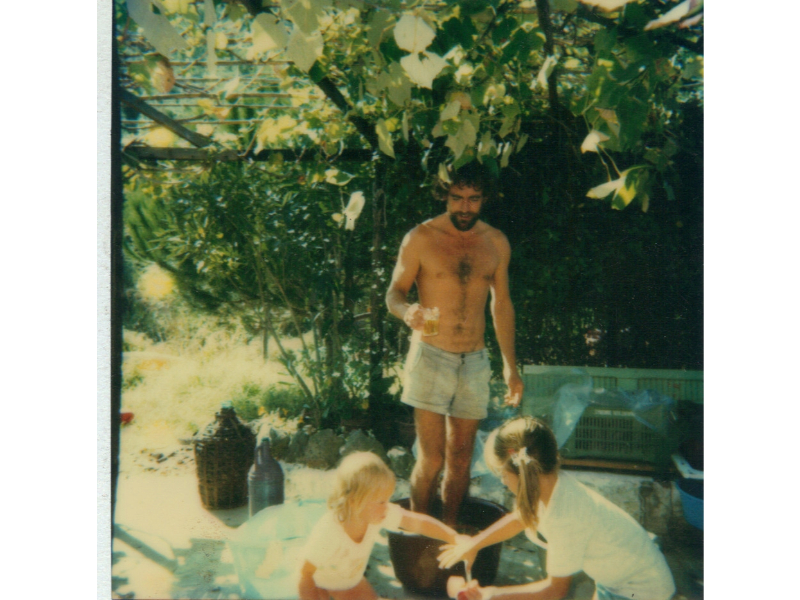
Here's John "pressing" grapes, with "help" from Zoi & Mara
He eventually hooked up with one of Lida’s sisters, Liesbeth, and they now live in New Zealand and have a son and daughter. Both John and Liesbeth talk in their sleep, and one time, before they got together, when John was sleeping in the little loft of the “A” frame and Liesbeth was crashed on the couch, it seemed as if they were having a conversation as both of them were mumbling away. John and I ran the garden business for several years but he would always go back to London to work in the winter. He introduced me to windsurfing as he had the use of someone’s board at Troulos Beach. I fell in love with it although I was initially not at all good, I had found the way to relate to the sea which I otherwise thought was pretty boring. I didn’t like swimming at all, but being on a plastic “plank” that couldn’t sink, suited me perfectly. Our daily schedule was to start work in the garden as soon as possible, before it got too hot, and then go to the beach from around 12:00 until 17:00. We would then return and continue in the garden until it became dark. This gave us an excellent lifestyle with the girls being on the beach almost every day, meeting kids from all over the world. Lida swum and John and I windsurfed if there was a good breeze blowing. The best winds used to blow from 11:00 until 13:00 when they started to drop so, if these winds were blowing, it was a mad panic to get the garden work done and get to the beach before it was too late. I would go into Town on Mondays, Wednesdays and Fridays to sell the veg. and we picked on the evening before. This left us Saturday as a “day off”, but there was always something that needed tending to. It was a great lifestyle but didn’t really earn us much money. Still, we weren’t here for the money, we were here to be able to choose our own lifestyle and we had certainly found a good one. After some years John decided he couldn’t keep living just drifting along having a good time and, with our encouragement, he decided to stop and try to find something a bit more permanent. When he left, he ran into Liesbeth at Athens Airport quite by chance and they flew back together to Amsterdam. They never looked back! The previous winter, John had been working painting a friends house when he met Jacques, a Frenchman who was working for a builder doing skilled renovation work on the same house. They got on really well and John told Jacques about Skiathos. Jacques came to visit the following spring for a week and loved the island. He was looking for a change, having worked in London for a year honing his English, and asked if there was any work on Skiathos. As he was a skilled builder, tile layer, plasterer (and much else besides), I suggested he took John’s place in the garden the following summer and that in the winter months, I was sure I could find work for both of us (with Jacques as the Master builder and me humping the cement behind him). This is the way it worked out. It was strange, but all my partners introduced me to my new partner before they left. Jacques never left Skiathos and didn’t introduce me to a new partner, but eventually bought his own land with Rose (an old friend of ours from Amsterdam) and built his own house.
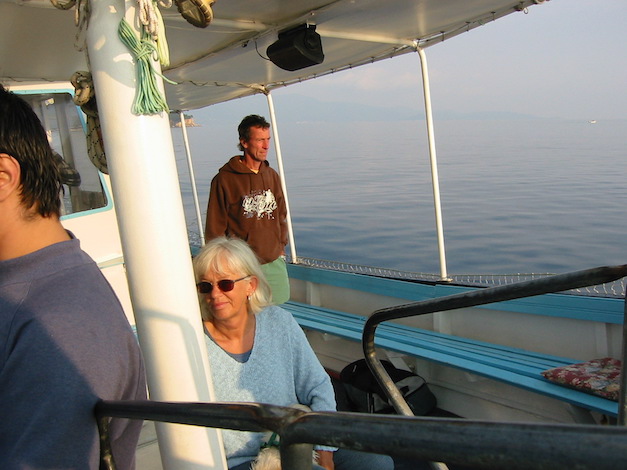
Jacques & Rose
In all, we ran the market garden for 13 years, refining our production techniques
all the time. We built small plastic greenhouses to bring our seedlings on earlier,
refined the watering systems so that it didn’t take so much of our time,
used tomato varieties that didn’t need tying up, and generally found ways
to produce more with less work, whilst making sure we did not deplete the land.
When Jacques and I went our (amicable) separate ways, it was also the time when
my parents died, and with the money that they had left me, we changed our lifestyle
quite considerably, not putting in a commercial garden any more. I switched
my moneymaking activities to the Internet (which was just taking off in 1994)
and we started letting the two villas, which we had managed to build over the
years.
We are still very involved with our land, are constantly improving it by planting
trees, and always keep a small organic garden for ourselves. The land has taught
me patience, taught us that you have to give to get, and taught us that some
of the best things in life take time, but are well worth waiting and working
for. Although we “own” the land, all we really own are some bits
of paper. We have always felt that we are but stewards of our piece of the beautiful
Zorbathes valley, and we are obliged to treat it well, and hopefully, leave
it in better heart than when we found it.
On every trip to Volos, I had coveted a small, articulated, vineyard tractor.
Hiring a tractor and driver to prepare our garden plot was always fraught, and
I never got the result I wanted. The tractor cost 300,000 Drachmas (about 3,000
GB Pounds, then) and with help from my parents, Auntie Win, and a villa owner,
we bought it. I subsequently had a dispute with the villa owner about how the
tractor would be used, and we bought him out. This gave me the freedom to start
contract ploughing and cultivating for the local Greeks. I only did small, garden
sized plots, as the tractor was not made for larger areas, and there were many
of these plots in and around Town where the locals grew their vegetables and
vines. This didn’t bring me into any conflict with the other tractor owners
whose tractors were much bigger than mine. And, as usual, I worked on the principle
that it was their island and they had first rights to everything. (We always
found that if your respected the islanders, they would, in turn, respect us.)
In the Spring and Autumn, I would be chugging around on the tractor, and every
summer, busy working in the market garden. This worked fairly well for several
years but I was starting to get quite severe back problems from sitting on the
tractor, half turned around, and being bounced up and down. At this point, Jacques
turned up to become my new partner in the garden, and subsequently my partner
in building, renovating, and tiling for other people during the winter months.
This was also hard on my back but was nowhere near as bad as the tractor had
been.
Our first job was to help a team of plasterers, plaster a new building. The
boss had heard that I was touting Jacques as a Master plasterer, and offered
us 4 days’ work, Jacques plastering and me on the concrete mixer. When
we started, Jacques was plastering the way they did it in France, which is totally
different from the Greek method. The boss came to me shouting, “He doesn’t
know what he is doing!”. I placated him and said, “Just show Jacques
what you want, and he will do it.” He did, and Jacques got on happily
with that technique. We worked incredibly hard that day, and it was a struggle
to get up for day 2. However, we managed and spent the 2nd day working even
harder! At the end of the day, the boss told us that the job was finished, he
wouldn’t need us anymore and paid us our wages. It was just as well as
there was no way we could have turned up for another day! In retrospect, we
realised that they had all worked really hard to push us, and test whether we
really were good workers. We passed the test and our reputation was made! The
following work we received was from a cousin of the boss who needed some tiling
done. It was much easier, and confirmed our reputation as good, skillful, builders.
After this, we worked hard, but in our own time, turning up for work a couple
of hours after the Greeks normally would, but then staying on much later than
they did. As I was the only Greek speaker at that time (Jacques now speaks good
Greek), I organized the jobs. Although I knew a lot about building, Jacques
was the master builder, and I was the “humper”; making the mortar,
supplying him with tiles, passing him the necessary tools, etc. We specialized
in tiling work as we were paid by the square meter, and could make quite good
money once we had our teamwork down pat. We had an excellent working relationship
and spent as much time laughing as working. My idea of what work should all
be about. In the end, Jacques and I managed not only to make a good living and
save some money, but also (eventually) build the four houses and swimming pool
which we now own. Jacques found a good plot of land at a reasonable price and
slowly built 2 houses on it.
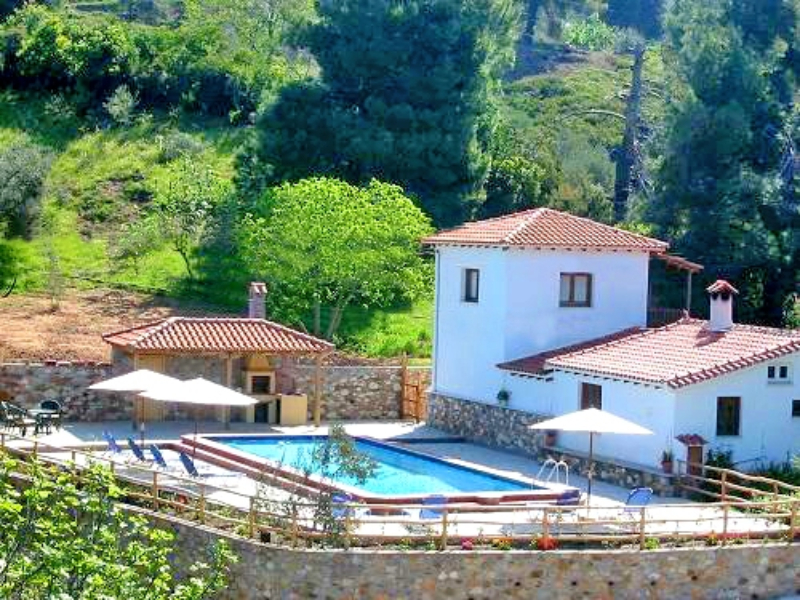
The Barn & pool
After a long and mutually happy partnership, we went our separate ways. My parents had both died, just 39 days apart, and they left some money which allowed us to do 4 things: send the girls to a good school in Athens where they learned in English, build a house of stone (The Farmhouse), which I had always wanted to do, buy a catamaran, and gave us a year out to see which way we wanted our lives to go. The last was a luxury that most people do not get. We are usually too busy trying to earn a crust, feeding the kids, paying the debts (mostly mortgage), and all the other things that kept noses to grindstones. I wanted to steer away from hard physical labour, which was starting to take its toll on my body, and I had discovered the Internet. Lida discovered tennis which helped fill the hole that the kids had left when they went to Athens. I ahad always wanted to buy myself a sailing catamaran and went to the UK to get myself a computer, a book about the Internet, and a sailboat. I managed all three and you can read more about the catamaran’s adventures getting to Greece in the section on Fun.
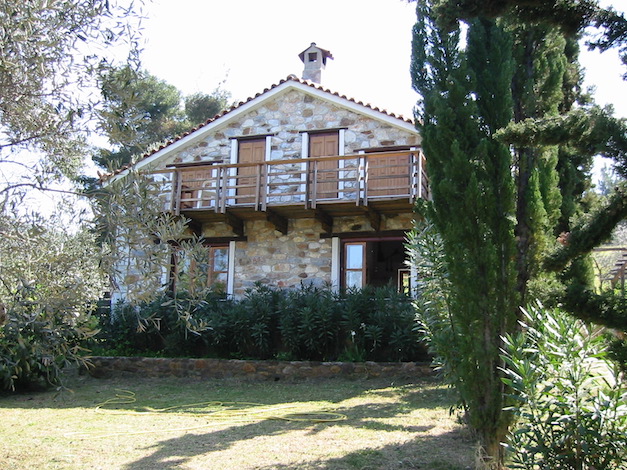
The Farmhouse
Jacques teamed up with an Albanian builder and they made an excellent name for themselves, specialisingparticularly in renovations. They built our swimming pool, and they had to organize the big pour (the entire shell of the pool) in one day. Because we couldn’t bring ready mix concrete lorries up our narrow road, they organized 17 workers (mostly Albanian), 3 concrete mixers, and arranged for small lorries bringing the materials of sand, cement and gravel, to turn up at regular intervals, as there also wasn’t enough room to put all the materials in one place before the pour. A logistical nightmare, but one that they handled very efficiently. It was their first pool project and they took great pains to make sure that they got it exactly right.
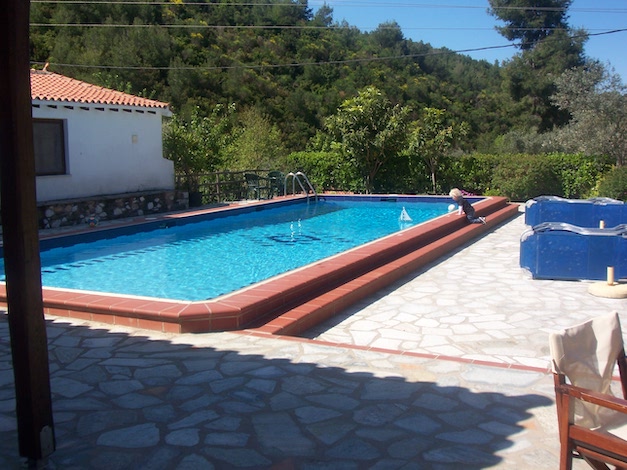
The pool terrace
We started to rent out the two villas, The Barn and The Farmhouse, to tourists as an alternative income. See Zorbathes.com for more information.
I had been exploring the Internet and thought that it would be
a good idea to make a web page to advertise the villas. This was at the beginning
of the World Wide Web, and almost nobody on Skiathos had heard of the Internet.
I made one very simple web page in MS Word (believe it or not), as it had a
simple converter from word processor to html code. I made a connection to a
provider in Volos, on the mainland, and published the page. I would have to
dial up to Volos, with an extremely slow connection of 14,400 bits per second,
to check email or update the web page. It was very expensive, and there wasn’t
yet an awful lot of information available, but I thought it was brilliant! I
could sit in what I consider one of the most beautiful places in the world,
access any information I wanted, and ignore all the rest. I started to get some
email inquiries for information about Skiathos, which I always answered. It
occurred to me that it might be a good idea to get a domain name and make a
proper information site about Skiathos, which would hopefully bring more guests
for the villas. Some canny French Canadian had already taken the domain name
skiathos.com, so I decided to register the name, skiathosinfo.com. I started
adding pages of information to the site and watched as the hits slowly climbed.
"How can I make some money out of this?", I thought. Perhaps I can
advertise (make web pages for) other accommodation on the island. Advertise
businesses and property for sale as well. Although most people on the island
still didn’t really understand what the Internet was (“Does it appear
on the TV?”), they understood the principle of advertising, and as I wasn’t
asking much per web page, a few accommodations and businesses paid me a yearly
fee for a page. This slowly grew as the islanders started to understand that
they were getting more bookings by having a page on my site. Slowly, emails
took the place of fax numbers and it started to take off. The island had its
own Internet provider by this time and it was starting to work at faster (but
still slow) speeds. The only group of people who weren’t interested in
paying for a web page, were those who wanted to sell their property; land, town
house, or villa. They were used to real estate brokers finding buyers (and every
Greek and his mother was a “real estate broker”) and taking a commission
once a sale was completed. OK, I thought, why don’t I do the advertising
and if I make a sale, I might make some decent money via the commission. In
this way, I got into real estate brokering, although it had been the furthest
thing from my mind. Real estate agents and brokers, like lawyers, had (probably
well-deserved) terrible reputations, so the only thing I had to do, to be better
than all the rest, was to be honest. Not very hard for me, as I had always tried
to be honest and straight forward in my dealings with everyone. I also had the
great advantage that I wasn’t Greek. The Greeks do not trust each other
(even though I think they are, overall, pretty trustworthy), and being English
helps as well, as for some (definitely mistaken) reason, they think that all
Englishmen are honorable!
So, we suddenly found ourselves with 3 businesses, letting the villas, making
web pages, and selling property. As I wanted to keep my Greek Farmer status
(a peasant!), Lida made a small, personal company to cover all the other aspects
of our work, even though she was only involved in the letting of the villas.
This is very common in Greece, and the local hardware store, smithy, mini-market,
etc. will often be registered in the name of the wife, but be run completely
by the husband. This is not a tax dodging wheeze, but often the men of the family
are doing two jobs, running their business, but also working in the building
trade or with tourism in the summer. A note here about “lazy Greeks”,
I have never seen people work so hard as the Greeks (which is why most Greeks
abroad are very successful), but when they stop work, they completely stop.
Then it is time for good company, good food, and good wine or tsipouro.
The real estate work started to become very successful, but I still found time
to expand the Internet business. There was plenty of work in Skiathos, as the
economy was doing very well, and the web site was expanding apace. However,
the hardest work in Greece is getting paid for what you had produced or labored
for. I was spending many hours chasing up people to pay their yearly fee for
their web page, and this was becoming very tiresome. I made another web site
for all the properties for sale, and www.skiathosproperty.com was born. On the
advice of some close American friends, I decided to open an office and take
on a junior partner. I had known Gigi, a beautiful half Dutch, half Greek lady,
for some years, and thought that she would be an asset to the business. She
was fed up with the café that she was running, and we agreed to see if
we could work together. We kitted out the office and got stuck in. The real
estate business was taking off and the Internet business was ticking over nicely,
but what I hadn’t realised was that an office ties you down to regular
hours. People expect someone to be in the office to answer questions, etc.,
and I found myself sitting in front of a desk far too much. I could, of course,
share these duties with Gigi, but it started to rankle a bit. After a year or
two, it also became apparent that most people who came to the office were time-wasters,
and that the really serious people had already contacted us via email or through
our web site. We probably only sold a very few properties to people that just
walked in the door. Things were going well, but then I had my accident with
Merlin, the catamaran. I spent weeks in hospital in Athens, and then quite a
few more at home recuperating, before I could get back to work. Gigi and I had
thought about employing a secretary come office manager, and we had talked to
Jacqui, an English lady who had left similar work in the UK to come to live
on Skiathos. She said she was willing to work for us, so I told Gigi to take
her on as it would be impossible for Gigi to show properties to prospective
buyers, and man the office at the same time. This worked very well and for 3
years, all 3 of us were earning a good monthly wage, with a bonus at the end
of the year. Then 2008 came along and the whole system got screwed by the banks.
We struggled on for a bit but then in 2010 came “the Greek crisis”,
when all the dodgy shenanigans by the banks, Greek politicians, and rich Greeks,
came to light. It was obvious that the real estate market was plummeting and
Gigi and I decided to split up. She was thinking of moving to Athens in any
case, and I certainly couldn’t afford to have an office, a partner, and
pay a secretary. Gigi had always wanted to get involved with letting high end
villas (something which didn’t attract me at all), so we agreed that I
would stay in the real estate business, and she would try her hand at letting
the villas. Jacqui, did a couple of summers as a waitress but then opened a
shop selling beautiful driftwood art that her husband, Ray, was making. I am
happy to say that it went very well.
I spent the slump years ticking over. There was the odd sale of a property here
or there. I advised people about how to make their property legal (a requirement
that hadn’t been necessary before!), and I sold the skiathosinfo business
to the son of an English villa owner. In the meantime, the villas were still
renting well, so although we had to tighten our belts a bit, we were OK. We
also installed a large (10 Kilowatt) photovoltaic system on the roof of our
house, and managed to get a very good feed in tarif for selling it back to the
grid. This boosted our income a bit. We subsequently added panels to all the
houses, plus solar water heating systems, and this has made ourelectricity bills
very low indeed. As all our houses have comparitively shallow roofs, all these
panels are very unobtrusive and don't detract from the aesthetics of the valley.
The rest of Greece (except the islands) suffered immensely, and the Greeks found
themselves ground down by austerity so that profligate banks could get their
money back via ever higher and higher taxes. I discovered that I didn’t
need an office at all, I did most of my computer work at home and met potential
buyers at cafes on the waterfront that had WiFi, so almost every café
became one of my “offices”. This suited me much better as I had
never been one for fixed hours in a working schedule. I liked the fact that
sometimes I didn’t go to Town at all, or other days was away for the whole
day. Lida and I had never really had a fixed routine, so it worked pretty well.
In 2015 (7 years after the crash, 7 years seem to be important!), the real estate
market started to take off again. Nothing yet like it was until 2008, but there
was light at the end of the tunnel. However, I was by then 67 and wanted to
start to think about doing other things with whatever time I had left remaining
to me. Write this book, for example. I had sold some houses for a very nice
Greek couple, Thanasis and Eleni, who were a civil engineer and architect, and
who had built a complex of houses with fantastic views on the way to the Monastery
of Evangelistra. We had worked well together in the past and they had mooted
the idea of working together. Their daughter Lila, another architect, was moving
to Skiathos and we all discussed the idea of the three of them taking over the
real estate business. We came to a mutually agreeable arrangement and I started
to plan my retirement. I have been “retiring” for the last 5 years,
but now I am determined to stop, while still giving Thanasis, Eleni and Lila
any support they might need to keep the business going successfully. It seems
to be working well, and I hope that by the end of this year (2019), I will be
a “lazy Greek”!
If you are interested in acquiring a little piece of heaven, their web site is here: Skiathos Property
People say that I will be bored, but I am sure that Lida will find lots of things
for me to do, and besides, we would like to travel more and see as much of the
world as possible before we pop our clogs. I still find the Internet fascinating
(at least those parts that haven’t been hijacked by big business &
trolls), and there is so much to learn and grow from. I cannot imagine not having
an organic garden, although if we start to travel more often, this may become
more difficult to sustain. I still love sowing, planting, weeding (not so much)
and finally picking something fresh and having it on the table within minutes.
Not only has it saved us money, but we know that what we are eating is fresh,
natural, and good for us.
Both Lida and I now receive (smallish) pensions, perhaps enough to live on at
a very simple level, but that is how we lived for many years, so we don’t
really see a problem with that. We also have an income from our photovoltaic
system and the villas, and I am sure I will find some way to squeeze a bit more
from the Internet. We (finally) have a house that is so well insulated that
it is very easy and cheap to keep warm in the winter and cool in the summer.
We produce our own wine, tsipouro and whisky, fresh food, wood for heating and
electricity for everything else. Somehow, we have come full circle and are now
pretty much self-sufficient. But now we have all those “mod cons”
that make life comfortable in this day and age.
<Back to contents> <Next chapter>